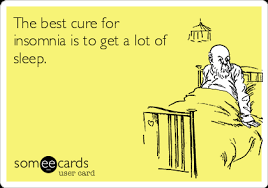The Impact of Menopause on Insomnia
Menopause is a natural biological process that marks the end of a woman’s menstrual cycles. During this transition, hormonal changes can lead to a variety of symptoms, including hot flashes, mood swings, and insomnia. Insomnia, or difficulty falling asleep and staying asleep, is a common issue that many women experience during menopause.
One of the primary reasons for insomnia during menopause is the fluctuation in hormone levels, particularly estrogen and progesterone. These hormonal changes can disrupt the body’s internal clock, making it difficult to maintain a regular sleep schedule. Hot flashes and night sweats, which are also common symptoms of menopause, can further contribute to sleep disturbances.
Additionally, other factors such as stress, anxiety, and lifestyle habits can exacerbate insomnia symptoms in menopausal women. Poor sleep quality not only affects energy levels and mood but can also have long-term effects on overall health and well-being.
Managing menopause-related insomnia involves a multifaceted approach that addresses both the hormonal changes and lifestyle factors contributing to sleep disturbances. Here are some strategies that may help alleviate insomnia symptoms during menopause:
- Establishing a bedtime routine: Creating a relaxing bedtime routine can signal to your body that it’s time to wind down and prepare for sleep.
- Creating a sleep-conducive environment: Keep your bedroom cool, dark, and quiet to promote better sleep quality.
- Regular exercise: Engaging in physical activity during the day can help improve sleep patterns and reduce stress levels.
- Mind-body techniques: Practices such as meditation, deep breathing exercises, or yoga can help calm the mind and promote relaxation before bedtime.
- Dietary adjustments: Avoiding caffeine and heavy meals close to bedtime may help improve sleep quality.
- Seeking professional help: If insomnia persists despite trying self-care strategies, consulting with a healthcare provider or sleep specialist may be beneficial.
It’s important for women going through menopause to prioritize their sleep health and seek support when needed. By addressing the underlying causes of insomnia and implementing healthy sleep habits, women can better manage this common symptom of menopause and improve their overall quality of life.
7 Common Questions About Managing Menopause Insomnia
- What helps with menopause insomnia?
- Does menopause insomnia go away?
- What is the best sleep aid for menopause?
- How to deal with hormonal insomnia?
- What are the 5 stages of menopause?
- What medication is used for insomnia during menopause?
- What helps with insomnia during menopause?
What helps with menopause insomnia?
Menopause insomnia can be a challenging symptom to navigate, but there are several strategies that can help alleviate its effects. Establishing a consistent bedtime routine, creating a sleep-conducive environment, engaging in regular exercise, practicing mind-body techniques like meditation or deep breathing, making dietary adjustments, and seeking professional help when needed are all effective ways to manage menopause-related insomnia. By addressing both the hormonal changes and lifestyle factors contributing to sleep disturbances, women experiencing menopause insomnia can take proactive steps to improve their sleep quality and overall well-being.
Does menopause insomnia go away?
Menopause insomnia can vary in duration and intensity for each individual. While some women may experience temporary sleep disturbances during menopause that eventually resolve on their own, others may continue to struggle with insomnia for a longer period of time. It is important to note that menopause insomnia is often a result of hormonal changes and other factors that can be managed through lifestyle modifications, stress reduction techniques, and potentially medical interventions if necessary. Seeking support from healthcare providers or sleep specialists can help women navigate menopause insomnia and find effective strategies to improve their sleep quality and overall well-being.
What is the best sleep aid for menopause?
When seeking relief from menopause-related insomnia, many women wonder about the best sleep aid to help improve their sleep quality. While there are various options available, including over-the-counter and prescription sleep medications, it’s essential to consider individual preferences and health needs. Some women find success with natural remedies such as melatonin supplements, valerian root, or chamomile tea, which can promote relaxation and support better sleep. Cognitive-behavioral therapy for insomnia (CBT-I) is another effective non-pharmacological approach that addresses the underlying causes of sleep disturbances. Consulting with a healthcare provider or sleep specialist can help determine the most suitable sleep aid based on personal circumstances and preferences.
How to deal with hormonal insomnia?
Hormonal insomnia, a common issue experienced during menopause due to fluctuating hormone levels, can be challenging to manage. To deal with hormonal insomnia effectively, it is essential to focus on strategies that address the underlying hormonal imbalances and promote better sleep hygiene. Engaging in relaxation techniques such as meditation or deep breathing exercises can help calm the mind and body before bedtime. Additionally, creating a sleep-conducive environment by keeping the bedroom cool, dark, and quiet can enhance sleep quality. Seeking guidance from healthcare providers or specialists for hormone therapy or other treatment options tailored to address hormonal imbalances associated with menopause insomnia can also be beneficial in managing this specific type of sleep disturbance.
What are the 5 stages of menopause?
Menopause is a natural biological process that typically occurs in women between the ages of 45 and 55. While the concept of “5 stages of menopause” is not a widely recognized medical classification, menopause itself is generally divided into several phases. These phases include perimenopause, menopause, and postmenopause. Perimenopause refers to the transitional period leading up to menopause when hormonal changes begin and menstrual cycles become irregular. Menopause marks the end of menstruation, confirmed after 12 consecutive months without a period. Postmenopause follows menopause and encompasses the years beyond menopausal symptoms when hormone levels stabilize. Each phase brings its own set of challenges and symptoms, including insomnia, which can impact a woman’s quality of life during this significant life transition.
What medication is used for insomnia during menopause?
When it comes to managing insomnia during menopause, healthcare providers may recommend various medications to help improve sleep quality. Commonly prescribed medications for menopausal insomnia include low-dose hormone therapy, which can help regulate hormonal imbalances that contribute to sleep disturbances. Additionally, some women may benefit from the use of non-hormonal medications such as sedative-hypnotics or antidepressants to address insomnia symptoms. It is important for individuals experiencing menopausal insomnia to consult with their healthcare provider to determine the most suitable medication options based on their specific needs and medical history.
What helps with insomnia during menopause?
Managing insomnia during menopause involves a combination of lifestyle changes, self-care practices, and sometimes medical interventions to improve sleep quality. Establishing a consistent bedtime routine, creating a sleep-conducive environment, engaging in regular exercise, practicing relaxation techniques such as meditation or deep breathing, and making dietary adjustments can all help alleviate insomnia symptoms. Additionally, seeking professional guidance from healthcare providers or sleep specialists for tailored advice and potential treatment options can be beneficial in addressing menopause-related insomnia effectively. It’s essential for women experiencing insomnia during menopause to prioritize their sleep health and explore various strategies to find what works best for their individual needs.


